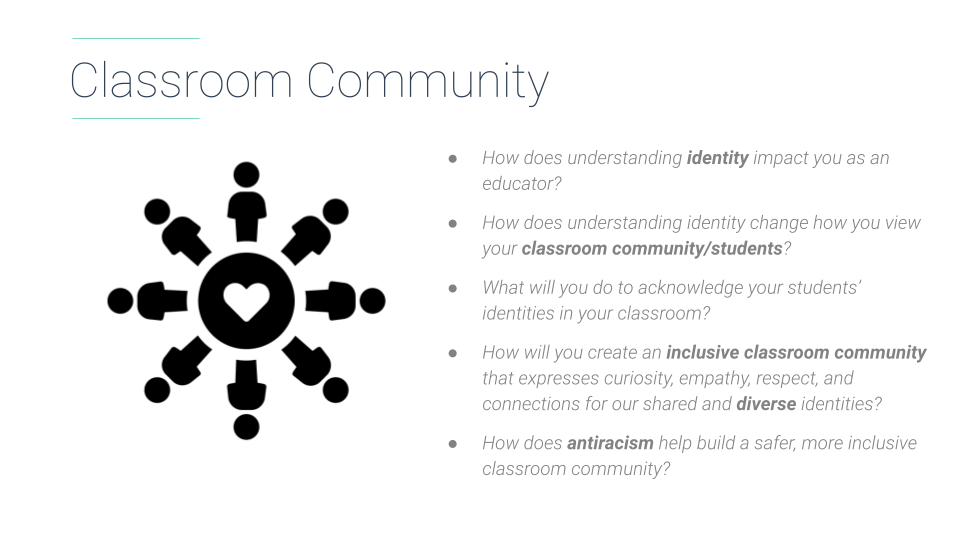Building an Antiracist Classroom
by Stacy Yung and Virginia Nguyen
Educate to Empower
During the fall of 2021, Educate to Empower hosted the Building an Antiracist Classroom Community workshop series with the goal of building community in the classroom and with fellow educators. In the workshop series, we, Virginia and Stacy, share the ways in which they build and foster their antiracist classroom communities. Together, with other fellow antiracist educators, the workshop series modeled, explored, guided, reflected, and provided resources and strategies for creating a classroom in which students feel welcomed and find a place of belonging. Our workshops are grounded in culturally sustaining pedagogies that combine philosophies, teaching strategies, and lessons from past and present. In the following, we provide an overview of the series and information on upcoming events.
At our first session, the series began with Identity & Community, where we began our antiracism journey with reflection and exploration of our individual identities and community. Starting with an exploration of identity is a beginning step towards building an inclusive classroom community because through reflection, one can better understand how they perceive themselves as well as how they are perceived by others. Participants left this session with a deeper understanding of identity and exploration by reflecting on questions like, “What will you do to acknowledge your students’ identities in your classroom?” and “How does antiracism help build a safer, more inclusive classroom community?” Select participants received a copy of the book “Tell Me Who You Are: A Road Map For Cultivating Racial Literacy“ by Winona Guo and Priya Vulchi to accompany their workshop resources and continue their learning.

Our second session in the series continued with Setting up the Classroom Community, where we modeled and shared different strategies for setting up the antiracist classroom community. Participants learned ways to build connections, foster friendship, and model trust in your classroom. This workshop built upon Alex Shervin Venet’s book Equity-Centered Trauma-Informed Education and focused on trauma-informed practices for building trust and relationships in the classroom. Strategies from Liz Kleinrock’s book Start Here, Start Now
A Guide to Antibias and Antiracist Work in Your School Community was also shared and select participants received a copy of that book to inspire continued antiracist teaching.
Our final session in the series concluded with Teacher Community and Reflection, where we spent our time building community with fellow educators. This was an opportunity to share and listen to how fellow educators have set the foundation for their antiracist classroom communities. The workshop utilized The Racial Healing Handbook by Anneliese A. Singh to guide our practice of claiming our antiracist identity. Together we reflected on our racial identity and engaged healing practices.
Participants gave overwhelmingly positive feedback. One participant wrote, “I think the workshop was very well designed, informative and highly resourceful. I can hardly think of anything else other than to commend the facilitators for their passion and dedication to this important work.”.
We look forward to repeating The Building an Antiracist Classroom Community workshop series in the winter of 2022 hosted by UCI Teacher Academy. Register for the workshops by completing this form.

Stacy Yung and Virginia Nguyen are history teachers with over 30 years of combined teaching experience. They are leaders in diversity, equity, inclusion, and allyship in Southern California and have trained thousands of educators. In response to the March 2021 murder of six Asian women, and the increased awareness of anti-Asian hate, they created Educate to Empower. Together they are creating and curating resources and hosting workshops for educators on topics of DEI and AAPI. They believe that educators committed to antiracism can change the world.
